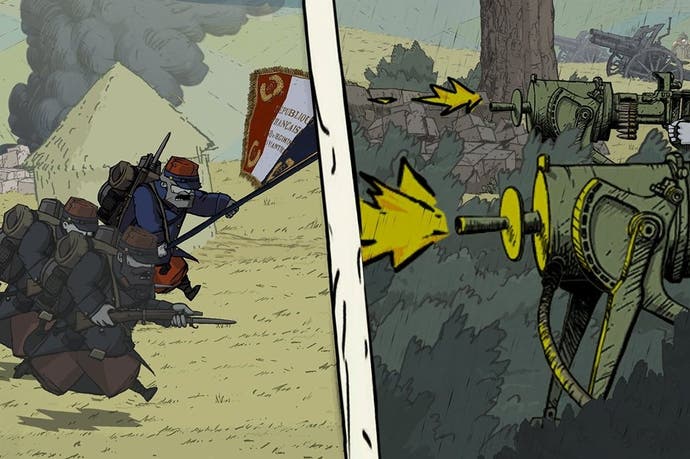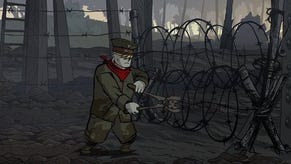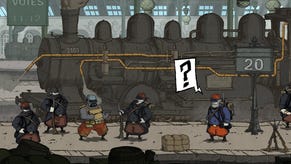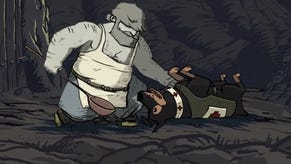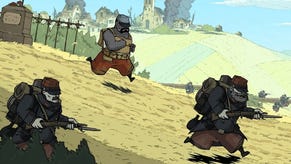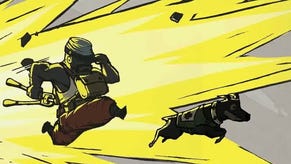Valiant Hearts: The Great War and Ubi's big push on the digital front
A tale of digital derring-do.
Did you know that embroidery was a popular pastime throughout the PoW camps of the First World War? It kept the hands and minds of the men engaged when it must have been near impossible to consider anything other than their current predicament. If ever I learnt that at school then it is knowledge that I've long since forgotten, but I definitely recall being told of the ravages of trench foot and how soldiers lost toes to prolonged exposure to the wet, oozing mud. A child's mind has a peculiar talent for retaining the outlandishly gruesome, I suppose.
Valiant Hearts: The Great War is full of such incidental details, brought to life by scores of collectibles scattered throughout its meticulously detailed, melancholic landscapes, to be pondered or pased-over as you see fit. At its heart, Ubisoft's latest digital experiment to be powered by the UbiArt Framework engine is an action-puzzler with a story that revolves around five characters of varied backgrounds, nationalities, genders and motivations, tied together by the indiscriminate consequences of war. But it's also about the many faceless and nameless mothers and fathers, sons and daughters, siblings, lovers, friends and comrades - individuals on both sides of the conflict who constitute the massive numbers that we're so used to hearing about in connection to The Great War - all wrapped-up in an interactive experience. Based on two hours play, it's coming together as a moving, funny and wonderfully realised game.
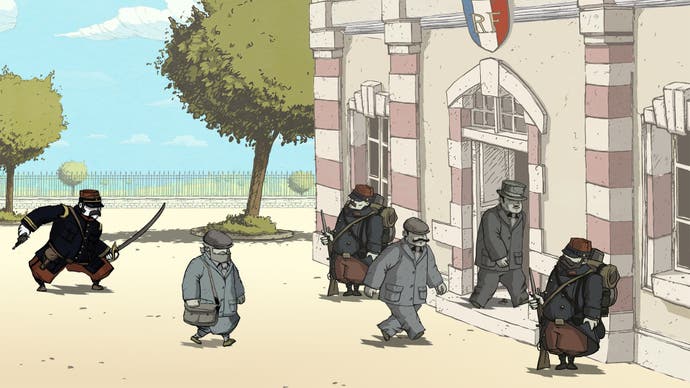
"Think of it another way," says Ubisoft Montpellier associate producer, Greg Hermittant. "It's a game about a war that's less popular than World War Two, where you don't kill people."
This is offered with a wry smile, but it rings true. There's renewed discussion about the First World War thanks to the commemoration of its centenary, but it is otherwise overshadowed by the conflict that came 21 short years later. Furthermore, while each of Valiant Hearts' characters has abilities to overcome obstacles and solve puzzles that range from clearing barbed wire, creating a makeshift sling out of a scarf or re-routing an underground generator to stop the dispersal of chlorine gas, nobody here dies as a direct result of my actions.
American Legionnaire, Freddie, knocks people out with a single punch but when he gets his hands on a grenade or TNT it's to clear the way through an underground bunker, rather than obliterate the troops fleeing from it. Nurse Anna applies her ministrations as best she can with limited and makeshift resources while upholding her Hippocratic Oath by pulling a German soldier from the wreckage.
Hermittant suggests that you'll take such meaningful actions throughout in order to progress the story of each character, sometimes in unison with another of the protagonists, sometimes alongside Walt, your canine companion. They are actions aimed at communicating the trials and tribulations of the war for both sides and all concerned, rather than pitting you in mortal combat against vilified opposition troops.
"Paul [Tumelaire, art director] and Yohan [Fanise, content director] are two people who don't like violent games and wanted to do something different to show the effects of war and promote that feeling in the game," explains Hermittant. "They wanted to highlight the idea that the war was hard for everyone, not just the allied forces and as the game went from a personal side-project to having a core team building it, we pushed to be allowed to work on it from this direction; the best example of that being the narrative tone."
This tone ranges from oppressively dark to unexpectedly light, with a high-tempo taxi journey through busy Parisian streets providing comic relief and calling to mind a castle-themed level from Ubisoft Montpellier's own Rayman Legends. So far, there's also a well-judged pitch to Valiant Heart's difficulty level, which is something that I was initially concerned could be a sticking point on account of Ubisoft attempting to appeal to the likes of regular game players, their offspring and gaming widow/ers the world over.
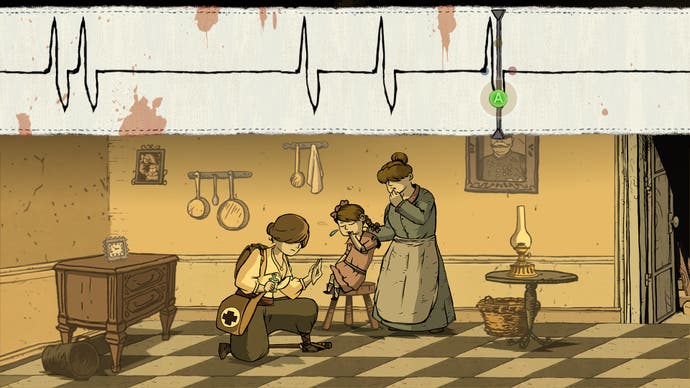
The Machinarium-style thought bubbles provide a clue as to what character might think or want but it can sometimes take several steps to satisfy their request and in one case asks that you judge whether a Frenchman might desire red or white wine with his lunch. There's a time-triggered optional hint system but otherwise the game provides you with the tools to solve a problem and lets you experiment in order to find the solution. Elsewhere, Walt the dog provides an extra dimension to puzzles with context-sensitive actions enabling him to reach areas that the player can't or distract guards at key moments. Walt also serves as an emotional anchor and offering him a simple belly scratch provides light cathartic relief after a particularly fraught sequence.
"It's very important for us to give the player a break sometimes and to provide contrast with the heavier moments," explains Hermittant. There are brighter elements in the beginning but it certainly gets darker as you progress throughout the story of the war and so we had to work to find the right balance between the slower sequences and the action, as well as the sad and the humorous sectors.
"We've tried to fit the game play with the character's personality and the heart of their story is love and family; it's a story about people and that requires balance."
This vertical slice of Valiant Hearts: The Great War certainly achieves this balance, and it will be fascinating to see whether the full game is as well judged as the two sequences on offer here. However, Valiant Hearts represents more than just a small team's passionate efforts to create an entertaining experience that endeavours to fulfil the duty to remember. It's also the latest in a long line of digital titles from Ubisoft that have come to form an increasingly important part of the developer-publisher's portfolio.
At last year's annual Digital Days event, EMEA executive director, Alain Corre boldly stated that "Digital used to be an afterthought; now it influences everything we do," and while the knee jerk reaction is to dismiss this sound-bite as so much fanciful rhetoric, it's evident that it has a grounding in reality. A great many of Ubisoft's core IPs have some form of second screen experience or companion app that can be accessed from an external device while away from the main game experience. Indeed, Thomas Paincon, EMEA marketing director of digital publishing, has previously said that any studio presenting a new project must also be prepared to answer questions on its plans for its mobile or digital approach. While this enforced adoption invariably results in as many hits as it does misses, it also means the publisher is actively encouraging broader thinking and so is open to propositions such as Far Cry 3: Blood Dragon, which took an existing high-profile IP and put a fantastically cheesy and neon-slathered slant on the main game's solid mechanics.
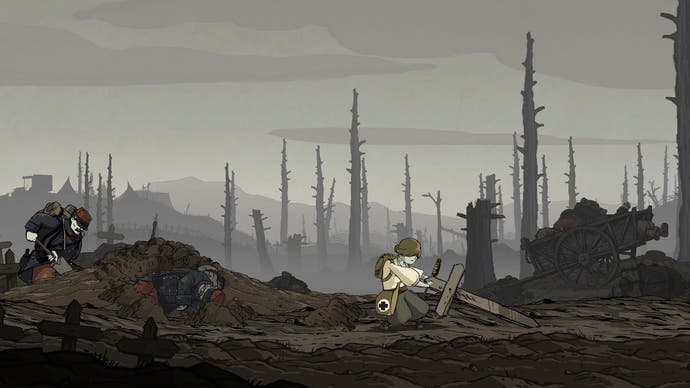
Not all of its attempts to leverage existing IP as profitable digital offerings have worked, of course, and it's when there's a clear vision for an original concept that little instances of magic can happen. The likes of From Dust, I Am Alive, Might & Magic: Duel of Champions and Child of Light prove that Ubisoft not only has the talent to take creative risks in the downloadable space but, more crucially, it also has the will and good sense to empower its developers to do so.
"I'm really proud to be part of Ubisoft and I think that willingness [to experiment with digital] is due to a mix of several things," says Hermittant. "I think management is really mindful of this, so that while there's a drive to create big, compelling experiences with things like Assassin's Creed, there's also the desire to talk to everyone to encourage creative diversity.
"[Ubisoft] Montpellier is well known for being creative, so if we can provide this kind of experience then we may be able to maintain both the triple-A titles for longer with their online experiences but also have smaller, quality titles like Child of Light and Valiant Hearts."
You can pick any number of duff digital titles from Ubisoft's back catalogue, of course, and most notably from the crop of third-party titles that it publishes. Even here, though, the depth and breadth is such that games like Trials, Outland and Shootmania prove that by spreading its bets it will unearth the occasional rough diamond or polished gem.
A couple of years ago, Ubisoft seemed to be fumbling in the dark, as typified by its wilful commitment to draconian DRM measures, some middling entries in high profile franchises and a truly bizarre E3 showing. Now, there's a brighter picture in which its digital titles - and in particular the consistently charming output of its UbiArt Framework - share the limelight with its big budget behemoths.
These days, Ubisoft is garnering a great deal more goodwill and its digital portfolio is playing a big part in that - quite aside from the persistent pointlessness of Uplay and the near criminal act of inflicting upon us first Fighters Uncaged and then having the gall to follow it up with Fighter Within. The creativity and passion of the real life splinter cells that exist within the hundreds-strong teams of its big budget franchises is helping drive the company forward and Valiant Hearts: The Great War is set to stand as Ubisoft's latest big push on the digital front.
